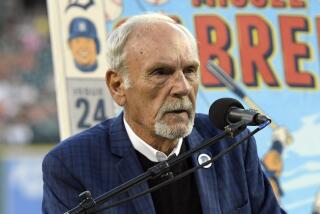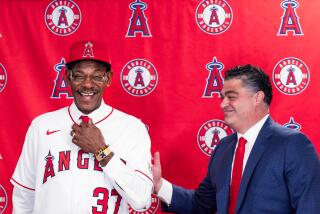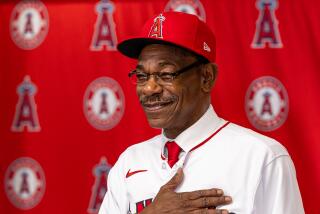Cito Gaston Is Getting Job Done as Toronto Manager
- Share via
TORONTO — The first 45 years of Clarence (Cito) Gaston’s life were conducted unobtrusively enough. It’s a stretch to recall that he hit .318 for the San Diego Padres in 1970, with 29 home runs and 93 runs batted in, and that he made his only All-Star team that summer. It’s a more distant reach to recollect that he played eight more National League seasons--earning a living and making a pension, but ultimately drifting off into the anonymity of baseball card collector’s heaven and eight years as a hitting instructor. He came to like it that way.
Two springs ago, in the roiling wake of The Campanis Affair, Blue Jays General Manager Pat Gillick approached Gaston and asked if he would be interested in managing. Not the Blue Jays quite yet, but winter ball. It would be an apprenticeship, servicing both the Jays’ belief that Gaston might make a useful manager someday and baseball’s fresh demand for minority candidates. No matter, Cito Gaston wasn’t hot on the idea. His father was ill, his second marriage (with two children added to his own two) was just getting its sea legs and life as a coach wasn’t at all intolerable. So he said no.
“I think he wanted to manage,” Gillick said, “but he just didn’t know when the opportune time was for him to do it. From some of the discussions we had, I think Cito was worried about the life expectancy of managers. He knew the mortality rate could be pretty high.”
Gaston said, “It wasn’t something I wanted to try at the time. I didn’t need it. I don’t have that kind of ego.”
Cut to 1989. Gaston has become the fourth black manager in baseball history, the second (after Frank Robinson) since Al Campanis awkwardly and accidentally thrust on baseball the issues of minority competence and opportunity. It is an ironic twist on progress, for in a time when others (Bill Robinson, Bobby Tolan) have voiced their aspirations and still others (Harry Edwards, chiefly) have policed the sport’s hiring, the Blue Jays have chosen the most reluctant of symbols. A man who has always preferred to stand in the background now stands for something. Something alive and current and important.
To say nothing of handling the Blue Jays, who for all their latent talent, have at times in the past two seasons seemed dead and outdated and insignificant.
“Cito’s in a tough situation,” Jays veteran catcher Ernie Whitt said. “It’s hard enough to come in and take a last-place club and turn it around. But he’s a minority, too, and the microscope is always going to be on him, on every move he makes. It’s unfortunate that’s the case, but that’s the way it is.”
For instance: The announcement that Gaston, interim manager since Jimy Williams was fired on May 15, would be the permanent manager was made on May 31, when the Jays were in Toronto. They returned to Toronto last Monday, to a crush of 450 media members. They were there principally for the opening of the SkyDome, but as long as Gaston was there and he the fourth black manager in baseball history . . . So Gaston was inundated. “That part,” he said, “has been a little more than I expected. That will calm down.”
He is a pleasant man, with a deliberate, resonant voice, tinged with remnants of a twang from his native Texas. The uniform still fits him in most places (in many more than, say, Don Zimmer’s does) and if the job isn’t quite so snug, he’ll give it time. Patience is one of his virtues, so he understands the madness of representing his race and saving his team all in the first two weeks.
“After the Campanis thing happened,” Gaston said, “organizations--this one has always been good--started to go out and hire minorities. But nobody’s going to force anybody to do something they don’t want to do, because that’s bad business and this is a business. I want to be judged as a manager.” And if that opens more doors? “That’s fine, too. But in the meantime, I’m just trying to give off positive vibes all the time, have a winning attitude every day at the ballpark. If we lose, we’ll get them tomorrow.”
Some of Gaston’s humility could grow from the manner in which the Blue Jays conducted their search. After Williams was fired and Gaston was named interim manager, Gillick said it was “99% certain” Gaston’s appointment would not be made permanent. When Bobby Cox left after the 1985 season, the Jays stayed within the system by hiring Williams, their third-base coach, to replace him. That decision had eventually produced a team in turmoil and in last place in the American League East.
“Not that it was Jimy’s fault,” center fielder Lloyd Moseby said. “We just didn’t play for Jimy. We didn’t make him a great manager.”
Still, the Jays didn’t plan to test the in-house theory again with Gaston. They went after Lou Piniella in a big way, but refused to meet George Steinbrenner’s demand for a starting pitcher in return for letting Piniella out of his contract. White Sox coach Terry Bevington was considered, along with Bob Bailor, manager of the Jays’ Triple-A team in Syracuse. At least two teams reportedly wouldn’t let the Jays interview their coaches. So on the last day in May, it came back to Gaston, no better than fourth choice. But by then, coincidentally, the quiet man had decided he was ready for the job.
The Blue Jays were 13-24 when Williams was fired, 7-7 with Gaston as interim manager. They have a winning record since he was named manager for the season. “I had always felt it was better for them to go outside, because of what happened (with Williams),” Gaston said. “But as time went on, I just found it to be a challenge. A lot of us have been here for a long time, trying to take this thing all the way.”
Gillick is still terse on the matter. “Piniella is the guy we really wanted,” he said. “But we saw that whole deal fall apart. So we’ve got this hot seat and nobody seems to really want it. So we felt we needed somebody who knows the players. Cito does. He can’t worry about whether he’s our second or third choice or whatever. He’s our manager.”
At least until the end of the season, which is as long as his contract runs.
In the ninth inning of last Wednesday’s 4-2 victory over the Brewers, Jays pitcher John Cerutti lost his shutout on a two-run homer by Rob Deer. He struck out Greg Brock for the second out of the inning, but then gave up consecutive singles to Charlie O’Brien and Mike Felder. Gaston walked out to talk to Cerutti.
“He asked me how I was,” Cerutti said. “I told him I was fine.”
With the tying run on first base and the Jays suddenly facing the possibility of going oh-for-Dome in the first series in their $500-million stadium, Gaston left Cerutti in. Why? “I wanted him to get the complete game,” Gaston said.
Maybe he also wanted to rest his bullpen, which has been hammered of late. But that’s not the point. By leaving Cerutti in and letting him finish his game (which he did, for only the fifth time in his five-year career), Gaston put his signature on the game. He will be a players’ coach. Hitting instructors are often the players’ confidants, a buffer between the manager and his personnel problems. Gaston was tight with many of the Jays and that was a concern in hiring him.
“It still is,” Gillick said.
But the alternative--a man like Williams--had failed terrifically. Williams was largely uncommunicative and irreversibly at odds with temperamental slugger George Bell. “When Jimy was here, it seemed to be uptight all the time,” pitcher Jimmy Key said. “Jimy tried to shut himself off from the players all the time. Cito’s with them.”
Gaston said, “I’m close to the players, sure I am. But I’m close enough to know that if I have to do something that’s a little different, I’ll do it.”
He has assumed a franchise in a state of flux. The chassis of a team that won 99 games and a division championship in 1985 remains. But the engine has slowed: They lost their last six games to blow the division in ’87 and last year only a cosmetic 22-7 finish got them 12 games over .500 and within two games of the Red Sox. Moreover the SkyDome, with its deep power alleys and heavy air (when the roof is opened) is showing early signs of being a pitcher’s park. Gaston must subtly alter his team--which relied much on long balls in Exhibition Stadium--to squeeze any last success from this generation of Blue Jays.
“To me,” pitcher Jimmy Key said, “this team is not as strong as the one Jimy Williams took over. But it doesn’t need to be totally rebuilt and it’s not a club that can’t win.” Especially in the woeful American League East. Some of the Jays’ re-tooling will be visible (Bell and Moseby have been offered in trades); but much will be manipulative.
“This team’s got talent,” Whitt said. “But it hasn’t gone out on the field and proved it. You’ve heard of underachievers and overachievers. We’re looking for some overachievers.”
So start with Cito Gaston, The Coincidental Manager. Pushing through his placid softness is a knowing pause. Life is different, now.
“I get here earlier,” he said, scanning the Dome, “and I stay later.”
More to Read
Go beyond the scoreboard
Get the latest on L.A.'s teams in the daily Sports Report newsletter.
You may occasionally receive promotional content from the Los Angeles Times.










